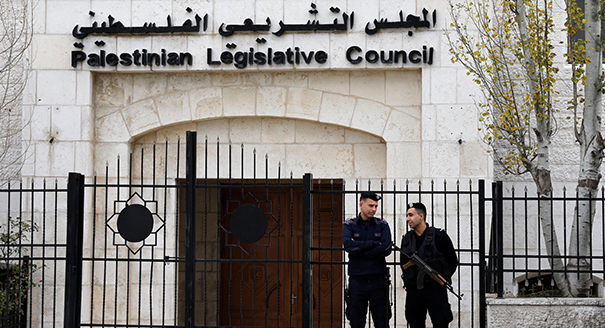It has been more than thirteen years since Palestinians last held elections. Recent developments, however, may provide an opening for new elections to the Palestinian Legislative Council (PLC), the Palestinian parliament.
In December, the Supreme Constitutional Court ruled that the Palestinian Authority president could dissolve the existing legislative council, which has been inactive since 2007. At the end of January, Prime Minister Rami Hamdallah offered his government’s resignation. While these two developments were primarily an outgrowth of the ongoing political struggle between President Mahmoud Abbas and Hamas, they provide an opportunity for the Palestinians to hold elections for a new PLC and begin restoring the democratic legitimacy of their governing institutions that had been declining in recent years. However, there are many obstacles in the path of new elections and the outlook is far from certain.
The Palestinian Authority has held four national elections since it was created in 1994 as a result of the Oslo Accords—twice for president in 1996 and 2005 and twice for the PLC in 1996 and 2006. International observers generally found those elections to be free and fair. The 2006 election for the PLC, however, resulted in a victory for the Hamas list and set in motion events leading to the current split between Gaza, controlled by Hamas, and the West Bank, controlled by the Palestine Liberation Organization (PLO) and Fatah. After Hamas forcibly seized power in Gaza in 2007, the Hamas-dominated PLC was not able to achieve a quorum, and Abbas has ruled by decree ever since.
The dispute between Abbas and Hamas has grown more heated in recent months. The Constitutional Court’s ruling allowing for the dissolution of the PLC, like Hamdallah’s resignation, was designed to weaken Hamas and strengthen Fatah. In particular, Abbas wanted to eliminate the possibility that the current speaker of the legislative council, a Hamas member, could succeed him as stipulated in the Palestinian Basic Law. Dissolving the PLC means there is no longer a designated successor to the president, leaving that decision effectively to the Fatah-led PLO. In addition, Abbas was also eager to end Hamdallah’s national reconciliation government, which was formed as a result of agreements between Hamas and Fatah.
Abbas has said he is committed to the ruling of the Constitutional Court, which called for a new PLC election within six months. The Fatah Central Committee has also endorsed the call for new elections. But one problem with which Abbas will have to contend is the prospect that Hamas will try to block a new round of voting. In the past it has been able to use its control over Gaza to prevent elections in the territory, leaving Abbas with the unappealing option of holding a vote only in the West Bank, which would have further cemented the split between the West Bank and Gaza.
This was always a deal-breaker for the Palestinian president. However, with no real prospect of ending the rift, Abbas may now be willing to go ahead with West Bank-only elections to thwart Hamas. Some democracy at this point may be better than none at all.
The Palestinians will also have to watch for Israeli obstacles preventing a vote. In particular, voting by Palestinians in East Jerusalem has always been controversial. The Oslo Accords provided for East Jerusalemites to vote at designated Israeli post offices in the city, and Israeli governments allowed this arrangement during all previous Palestinian elections. However, Israeli politics have moved significantly to the right since 2006, and it is unclear whether the current government (or the one that might emerge from Israeli elections in April) will allow it again.
Israel may also object if Hamas or other groups it considers terrorist organizations are allowed to campaign freely. Abbas has consistently made the inclusion of East Jerusalem a condition for holding elections, and he will not abandon this position today. But if Israel rejects the previous voting arrangements, the Palestinians should explore voting by internet, or other alternatives, and not allow Israel to exercise veto power over the elections. Previously, the United States was helpful in managing Israeli concerns about Palestinian elections, but it is unlikely that the Trump administration will be of much help this time. The European Union and others may be able to fill the void.
Perhaps the most significant potential obstacle to new elections is the diminished space for political activity within the Palestinian Authority itself. Since the last elections to the PLC, the Palestinian political scene has become more repressive, less open to freedom of expression, and more resistant to new political groups or nongovernmental organizations that pose a challenge to the existing parties. This atmosphere needs to change in order for a PLC election to be a meaningful contribution to Palestinian democracy. To accomplish this, Abbas will need to guarantee that all political groups can campaign freely and permit international observers and media outlets to confirm the validity of the process.
A flawed election would be worse than no election at all. As Palestinians grapple with bleak prospects for a resolution of their conflict with Israel, they will need strong and legitimate political institutions to advance their national movement in the period ahead. Elections can create this democratic legitimacy, but only if they are genuinely free and fair.






